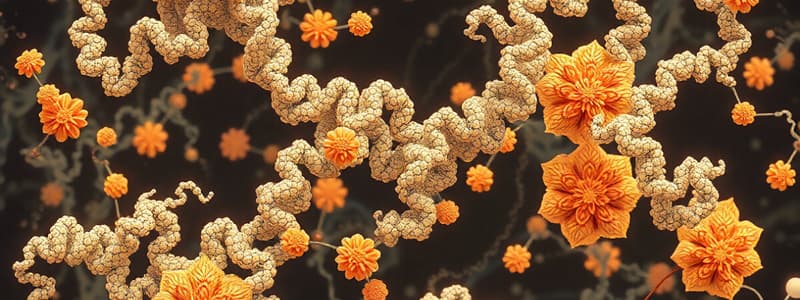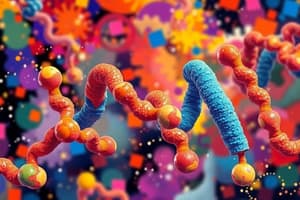Podcast
Questions and Answers
What type of bond is formed between a cation and an anion?
What type of bond is formed between a cation and an anion?
- Hydrogen bond
- Ionic bond (correct)
- Disulfide bond
- Covalent bond
Which statement accurately describes van der Waals interactions?
Which statement accurately describes van der Waals interactions?
- They result from the uneven distribution of electrons. (correct)
- They are strong, permanent bonds.
- They only occur between anions.
- They are caused by uniform distribution of electrons.
Which stage of protein structure is characterized by the folding of a single polypeptide chain into a unique three-dimensional shape?
Which stage of protein structure is characterized by the folding of a single polypeptide chain into a unique three-dimensional shape?
- Tertiary structure (correct)
- Secondary structure
- Quaternary structure
- Primary structure
What is the process called when a protein loses its native structure and becomes biologically inactive?
What is the process called when a protein loses its native structure and becomes biologically inactive?
How many amino acids are there that constitute proteins?
How many amino acids are there that constitute proteins?
Which type of chemical bond involves two sulfur atoms?
Which type of chemical bond involves two sulfur atoms?
What is the relationship between amino acid sequence and protein function?
What is the relationship between amino acid sequence and protein function?
Which of the following is not considered a stage of protein structure?
Which of the following is not considered a stage of protein structure?
Which environmental factor can cause protein denaturation?
Which environmental factor can cause protein denaturation?
What is the effect of mutations on protein folding?
What is the effect of mutations on protein folding?
What structure of a protein is primarily determined by the unique sequence of amino acids?
What structure of a protein is primarily determined by the unique sequence of amino acids?
Which type of RNA carries individual amino acids to the ribosome?
Which type of RNA carries individual amino acids to the ribosome?
What is the main function of enzymes in proteins?
What is the main function of enzymes in proteins?
Which level of protein structure results from interactions among various side chains?
Which level of protein structure results from interactions among various side chains?
How do peptide bonds form between amino acids?
How do peptide bonds form between amino acids?
Which of the following describes the secondary structure of proteins?
Which of the following describes the secondary structure of proteins?
What defines the quaternary structure of a protein?
What defines the quaternary structure of a protein?
Which of the following is NOT a function of proteins?
Which of the following is NOT a function of proteins?
What differentiates the 20 amino acids from one another?
What differentiates the 20 amino acids from one another?
Which property of amino acids influences the tertiary structure of proteins?
Which property of amino acids influences the tertiary structure of proteins?
What is the primary role of ribosomal RNA (rRNA) in protein synthesis?
What is the primary role of ribosomal RNA (rRNA) in protein synthesis?
During protein folding, what role do disulfide bridges play?
During protein folding, what role do disulfide bridges play?
Which type of protein function is primarily involved in communication between different tissues?
Which type of protein function is primarily involved in communication between different tissues?
Flashcards are hidden until you start studying
Study Notes
Proteins: The Workhorses of Cells
- Proteins are crucial for life, accounting for over 50% of the dry mass in most cells.
- They perform a wide range of vital functions, including acting as enzymes, defensive agents, storage units, transporters, hormones, receptors, and components of movement and structural support.
Amino Acids: The Building Blocks of Proteins
- Amino acids are the monomers that make up proteins.
- They are organic molecules with both carboxyl and amino groups.
- The 20 different amino acids are distinguished by their unique side chains, known as R-groups.
Polypeptides: Chains of Amino Acids
- Polypeptides are polymers formed by linking amino acids together through peptide bonds.
- The length of a polypeptide can vary from a few to over a thousand amino acids.
- Each polypeptide has a unique linear sequence of amino acids, which is crucial for its function.
Protein Structure: From Primary to Quaternary
- The structure of a protein determines its function.
- Primary structure: The linear sequence of amino acids in a polypeptide chain, dictated by DNA.
- Secondary structure: Coils (alpha helices) and folds (beta pleated sheets) within the polypeptide chain, arising from hydrogen bonds between amino acids.
- Tertiary structure: The three-dimensional shape of a single polypeptide chain, resulting from interactions between the R-groups of amino acids. These interactions include:
- Hydrogen bonds
- Ionic bonds
- Hydrophobic interactions
- Van der Waals interactions
- Disulfide bridges (strong covalent bonds between two sulfur atoms)
- Quaternary structure: The arrangement of multiple polypeptide chains in a protein.
Importance of Protein Folding
- Protein folding is essential for the structure and function of proteins.
- Errors in protein folding can lead to various diseases, including:
- Alzheimer's Disease
- Diabetes mellitus type 2
- Parkinson's Disease
- Transmissible spongiform encephalopathy
- Huntington's Disease
- And many more.
Denaturation: Loss of Protein Structure
- Denaturation occurs when a protein loses its native structure due to changes in physical and chemical conditions.
- Factors that can cause denaturation include:
- Extreme pH (acidity or alkalinity)
- High salt concentrations
- Extreme temperatures.
- A denatured protein is biologically inactive.
Studying That Suits You
Use AI to generate personalized quizzes and flashcards to suit your learning preferences.




